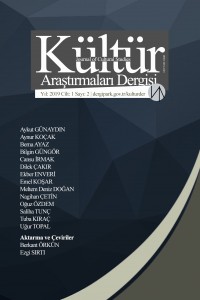Abstract
İnsanı diğer
türlerden farklı kılan en önemli hususlardan biri bireyselliğin ötesinde kolektif
olarak hayali yahut doğa dışı gerçeklikleri kurgulayabilme yeteneği olmuştur.
Kolektif insanın neyi başardığını anlamak için onun doğanın taklidi
niteliğindeki kültürel keşiflerin ötesinde, yani doğa dışı bir zihinle ne gibi
icatlar yapabildiğine bakmak gerekir. İnsan türünün bilişsel devriminde ilk
kurgusal anlatıların çok önemli bir yeri olmuştur. Bunlar genelde doğada
bulunmayan insan zihninin ürettiği ilk kurgusal gerçekliğin yansımaları idiler.
Bu, doğaya alternatif bir üretim ve evrim süreci olan kültürün zihinsel boyutu
olup insan zihninin evrimsel yaratıcılığının bir göstergesidir. İlk zihinsel
yetiler kazanmış bu insan, aynı zamanda doğa dışı gerçekliği icat eden mucit
insanın da yaratıcısı olmuştur. Yani doğayı evcilleştirme çabasına giren
insanın ilk önce kendi zihnini evcilleştirmesi gerekmiştir. Bunu da bugün
folklor dediğimiz kolektif bilinci oluşturarak yapmıştır. Muhteşem uygarlıklar,
yüksek edebî değere sahip sanatsal yapılar, muazzam büyüklükteki
imparatorluklar ve özellikle doğada bulunmayan mitos, din, adalet, eşitlik,
hukuk, demokrasi gibi toplumsal kavramları hayal edebilmemizi sağlayanın da bu
ilk kolektif akıl olduğu varsayılmaktadır. İnsanın geliştirdiği bu kurgulama
yeteneği aynı zamanda geçmişten günümüze folklorun da canlı kalmasını
sağlamıştır. Özetle folklorun başından beri ürettiği tüm düşünce ve uygulamalar
aslında onun doğayı yeniden şekillendirme çabaları, hatta doğal evrimin bir
nevi ıslahı olarak değerlendirilebilir. İnsanın bunu başarmasında ise toplumsal
kültürün en önemli eski üreticisi olan ilkel folklorun katkısı büyük olmuştur.
Çünkü bugün de olduğu gibi başından beri folkloru üreten kolektif akıl
olmuştur, diyebiliriz.
Keywords
References
- ARMSTRONG, Karen. (2006). Mitlerin Kısa Tarihi, (Çev: Dilek Şendil), İstanbul: MK Yayınları.
- BARNARD, Alan. (2014). Simgesel Düşüncenin Doğuşu, (Çev: Mehmet Doğan), İstanbul: Boğaziçi Üniversitesi Yayınları.
- CANETTİ, Elias. (2006). Kitle ve İktidar, (3. Baskı), (Çev.: Gülşat Aygen), İstanbul: Ayrıntı Yayınları.
- DAWKİNS, Richard. (2004). Gen Bencildir, (Çev.: Asüman Ü. Müftüoğlu), VIII. Baskı, Ankara: ΤÜΒİTAΚ Yayınları.
- FRAZER, James G. (2004). Altın Dal, Dinin ve Folklorun Kökleri I., II. Baskı, (Çev.: Mehmet H. Doğan), İstanbul: Payel Yayınevi.
- FRAZER, James G. (2014). İnsan, Tanrı ve Ölümsüzlük, İnsan Gelişimi Üzerine Düşünceler II. Baskı, (Çev.: Onur Aydın; İrem Demirel), İstanbul: Altın Bilek Yayınları.
- FREUD, Sigmund. (1975). Kitle Psikolojisi, (Çev.: Kâmuran Şipal), İstanbul: Bozak Yayınları.
- FREUD, Sigmund. (2012). Totem ve Tabu, (Çev.: Turan Erdem), İstanbul: Arya Yayıncılık.
- GOODY, Jack. (2011). Yaban Aklın Evcilleştirilmesi, (Çev. Koray Değirmenci), İstanbul: Pinhan Yayınları.
- HARARİ, Yuval Noah. (2015). Hayvanlardan Tanrılara, Sapiens, İnsan Türünün Kısa Tarihi, (Çev.: Ertuğrul Genç), VII. Baskı, İstanbul: Kolektif Yayınları.
- LÉ BON, Gustave. (1997). Kitleler Psikolojisi, (Çev: ?), İstanbul: Hayat Yayınları.
- LÉVİ-STTAUSS, Claude. (2012). Yapısal Antropoloji, (Çev. Adnan Kahiloğulları), İstanbul: İmge Kitabevi.
- MALİNOWSKİ, Bronislaw. (1998). İlkel Toplum, (Çev: Hüseyin Portakal), İstanbul: Öteki Yayınları.
- SWİNGEWOOD, Alan. (1996). Kitle Kültürü Efsanesi, (Çev.: Aykut Kansu), Ankara: Bilim ve Sanat Yayınları.
Abstract
One of the most important things that
differentiates human from other species is the ability to construct
collectively fictitious or unnatural realities beyond individuality. In order
to understand what collective human beings have accomplished, one should look
at what inventions can be made that go beyond cultural imitations of imitation
of nature, that is, with a non-natural mind. The first fictional narratives
have a very important place in the cognitive revolution of the human species.
These were the reflections of the first fictional reality produced by the human
mind, which is generally not found in nature. This is the mental dimension of
culture, an alternative process of production and evolution to nature, and is
an indication of the evolutionary creativity of the human mind. This human, who
gained his first mental abilities, was also the creator of the inventor human,
who invented non-natural reality. In other words, the human who tried to
domesticate nature had to tame his own mind first. He did this by creating a
collective consciousness which we call folklore. It is assumed that this is the
first collective mind, which enables us to imagine social concepts such as
great civilizations, high-literary artistic structures, enormous empires and
especially mythos, religion, justice, equality, law and democracy. The ability
of this editing which was developed by man has also kept the folklore alive
from the past to the present. In summary, all the thoughts and practices that
folklore has produced since the beginning can be considered as an attempt to
reshape nature and even a kind of natural evolution. In achieving this, the
contribution of primitive folklore, the most important old producer of social
culture, has been great. Because, as it is today, we can say that there has
been a collective mind producing folklore from the beginning.
Keywords
References
- ARMSTRONG, Karen. (2006). Mitlerin Kısa Tarihi, (Çev: Dilek Şendil), İstanbul: MK Yayınları.
- BARNARD, Alan. (2014). Simgesel Düşüncenin Doğuşu, (Çev: Mehmet Doğan), İstanbul: Boğaziçi Üniversitesi Yayınları.
- CANETTİ, Elias. (2006). Kitle ve İktidar, (3. Baskı), (Çev.: Gülşat Aygen), İstanbul: Ayrıntı Yayınları.
- DAWKİNS, Richard. (2004). Gen Bencildir, (Çev.: Asüman Ü. Müftüoğlu), VIII. Baskı, Ankara: ΤÜΒİTAΚ Yayınları.
- FRAZER, James G. (2004). Altın Dal, Dinin ve Folklorun Kökleri I., II. Baskı, (Çev.: Mehmet H. Doğan), İstanbul: Payel Yayınevi.
- FRAZER, James G. (2014). İnsan, Tanrı ve Ölümsüzlük, İnsan Gelişimi Üzerine Düşünceler II. Baskı, (Çev.: Onur Aydın; İrem Demirel), İstanbul: Altın Bilek Yayınları.
- FREUD, Sigmund. (1975). Kitle Psikolojisi, (Çev.: Kâmuran Şipal), İstanbul: Bozak Yayınları.
- FREUD, Sigmund. (2012). Totem ve Tabu, (Çev.: Turan Erdem), İstanbul: Arya Yayıncılık.
- GOODY, Jack. (2011). Yaban Aklın Evcilleştirilmesi, (Çev. Koray Değirmenci), İstanbul: Pinhan Yayınları.
- HARARİ, Yuval Noah. (2015). Hayvanlardan Tanrılara, Sapiens, İnsan Türünün Kısa Tarihi, (Çev.: Ertuğrul Genç), VII. Baskı, İstanbul: Kolektif Yayınları.
- LÉ BON, Gustave. (1997). Kitleler Psikolojisi, (Çev: ?), İstanbul: Hayat Yayınları.
- LÉVİ-STTAUSS, Claude. (2012). Yapısal Antropoloji, (Çev. Adnan Kahiloğulları), İstanbul: İmge Kitabevi.
- MALİNOWSKİ, Bronislaw. (1998). İlkel Toplum, (Çev: Hüseyin Portakal), İstanbul: Öteki Yayınları.
- SWİNGEWOOD, Alan. (1996). Kitle Kültürü Efsanesi, (Çev.: Aykut Kansu), Ankara: Bilim ve Sanat Yayınları.
Details
| Primary Language | Turkish |
|---|---|
| Journal Section | Research Articles |
| Authors | |
| Publication Date | June 17, 2019 |
| Published in Issue | Year 2019 Volume: 1 Issue: 2 |

